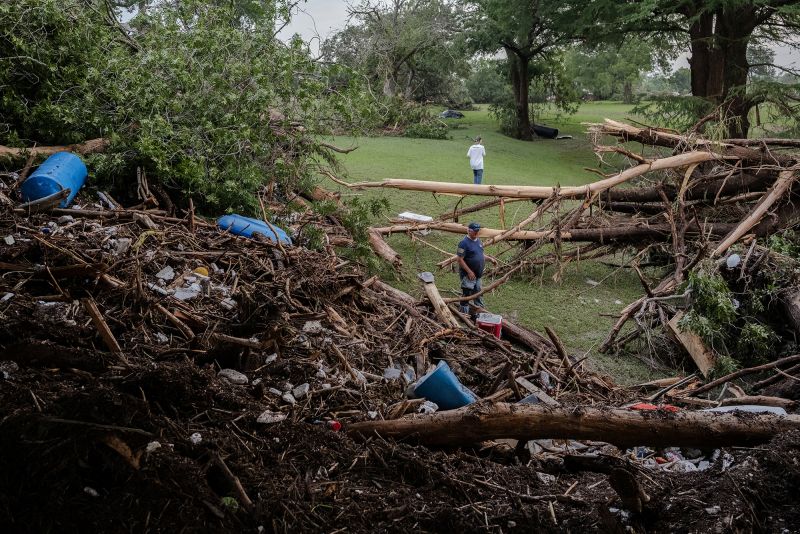When tragedies are in the news — natural disasters, plane crashes, fires — parents naturally and unavoidably react by thinking about what might happen to their own children. And children worry in turn about what might happen to them.
The flash flooding last week that killed more than 100 people along the Guadalupe River in central Texas, including dozens of campers and counselors at Camp Mystic, was a family nightmare come true. Every summer, kids hug their parents goodbye for camp, with both sides full of anxiety about what it means for children to be away from home and family.
Now that those normal worries are being amplified by the news from Texas, what should parents and kids do?
Children who have been planning for camp should still go to camp, even if it feels difficult, said Dr. Gail Saltz, clinical associate professor of psychiatry at New York Presbyterian Hospital, Weill-Cornell Medical College. “When we don’t do a behavior that makes us anxious, it restricts us further and actually tends to make us more anxious.”
Fear is understandable but it’s important to recognize when it becomes irrational and unnecessarily limiting, potentially even threatening formative experiences in children’s lives, Saltz said. The devastation at Camp Mystic feels especially distressing because summer camps are places people choose to go, that often hold their fondest memories.
The very nature of overnight camp removes the sense of control many parents feel when their children are home. “It’s a transition to something new and different. That evokes separation anxiety for both parents and kids, even in older kids,” Saltz said.
Watching an unfolding tragedy of this magnitude can trigger what Saltz calls “irrational, catastrophic fears” and deep feelings of helplessness — and just at the moment when families across the country are dropping off camp trunks or waiting for messages home.
No matter how unprecedented an incident, hearing about it makes it feel as if it’s likely happen again, “certainly in the immediate aftermath,” Saltz said. “It’s important to remember it’s bizarrely rare.”
The deadly flooding occurred after drought conditions and a massive amount of rain — another example of extreme weather events that are becoming more frequent amid rising global temperatures.
“It adds this element of helplessness — the same kind of helplessness, for example, that many people feel about guns and school shootings,” Saltz said. “And so that feeling of being stuck adds to that distressing, helpless feeling, not being in control.”
Bob Ditter, a clinical social worker for the American Camp Association, said stories from Camp Mystic alumni reflect a place that has been around for nearly 100 years and where people feel safe and a strong sense of belonging.
“The reason that this has resonated with so many people is the specter of having our safe, happy space swept away from us is just unimaginable,” he said.
Dr. Leslie Paris, an associate professor at the University of British Columbia who studies American childhood, said that camps have historically been treated as safe havens from crime and disease. They encourage tradition and nostalgia, too, drawing generations of parents “eager to provide similar opportunities to their own children.”
Going to camp has never been perfectly safe. Deadly drownings, disease outbreaks, and lightning strikes have happened through the generations, but not so widely or frequently that they drove campers away.
“The scale of the tragedy at Camp Mystic is particularly significant,” Paris said. “I think that we are collectively shocked because these are deaths so deeply out of order, so fundamentally wrong.”
Parents and caregivers should acknowledge their fears but resist the temptation to avoid anxiety or discomfort. They can do their due diligence about safety, including asking camps about their emergency plans and how they can communicate with their children.
But they’ll have to accept that some degree of uncertainty will always exist. Parents acknowledging and tolerating that uncertainty is a model for their children, Saltz said.
“You’re operating as a family. There are a million things in life that you cannot do if you can’t tolerate any risk at all,” Saltz said. “You can’t cross the street, you can’t fly to a vacation. Everything has some modicum [of uncertainty] so it is important in the world of resilience, experience, managing new tasks, to be able to tolerate that.”
How to talk to kids about tragedy
For parents with anxious children, Saltz suggests leaving the news out of family discussions or letters to camp.
“There’s no reason for a child in a camp in Vermont to be hearing about this camp in Texas,” she said. “In pre-internet days when camps were around, they wouldn’t have.”
Still, word will spread. And when it does, “the most important thing to do is to point out how rare it is to tell them that they can absolutely talk with you about it,” Saltz said. “They can ask you any questions. You may not know the answers, but you’ll try to find out for them.”
Ditter from the American Camp Association said that parents should emphasize “that there’s a difference between something that has happened to somebody else that resonates with us, but that hasn’t happened to us. It’s our empathy that makes us frightened and makes us feel these things deeply. In fact, we even have a name for it. We call it empathic distress.”
Saltz emphasizes that neither parents nor children should immerse themselves in the news.
“I would advise parents who have learned about the story not to keep watching the news story over and over again,” she said. “There’s no benefit, but there is repeated triggering.”
Even if it feels uncomfortable, children with mild anxiety disorder, mood issues or separation anxiety still benefit from taking risks and developing away from the normal routines of home.
But sleepaway camp may not be for everyone, including children with a panic or mood disorder, phobia, or who have experienced a recent tragedy or trauma.
“If you send them somewhere where they can’t get any treatment, you may be doing them a disservice,” Saltz said.


